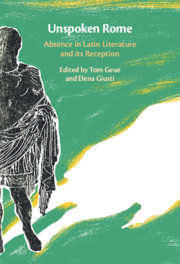Book contents
- Unspoken Rome
- Unspoken Rome
- Copyright page
- Contents
- Figures
- Unspoken Rome: Acknowledgements
- Contributors
- Introduction
- Part I Absence in Text
- Part II Absence in Context
- Part III Going Beyond
- Chapter 13 The Slave, Between Absence and Presence
- Chapter 14 In Search of the Lost City
- Chapter 15 Omnibus umbra locis adero
- Chapter 16 The Philology of Grief
- Chapter 17 Absence, Metaphysically Speaking
- Afterword Lights Out
- Bibliography
- General Index
- Index Locorum
Chapter 16 - The Philology of Grief
Catullus 101 and Anne Carson’s Nox
from Part III - Going Beyond
Published online by Cambridge University Press: 03 September 2021
- Unspoken Rome
- Unspoken Rome
- Copyright page
- Contents
- Figures
- Unspoken Rome: Acknowledgements
- Contributors
- Introduction
- Part I Absence in Text
- Part II Absence in Context
- Part III Going Beyond
- Chapter 13 The Slave, Between Absence and Presence
- Chapter 14 In Search of the Lost City
- Chapter 15 Omnibus umbra locis adero
- Chapter 16 The Philology of Grief
- Chapter 17 Absence, Metaphysically Speaking
- Afterword Lights Out
- Bibliography
- General Index
- Index Locorum
Summary
This article examines the fraught relationship between loss and poetic creation in Catullus 101 and in Anne Carson’s Nox. I argue that Catullus 101 performs a process of mourning through substitution, turning from absent brother to present poem. This process risks becoming an abandonment of his brother, and significant contradictions linger in the poem between the demands of mourning and of learned poetry. I then show how Anne Carson takes up these tensions in Nox while exploring philology and mourning as two related responses to loss. I argue that Carson practices an obsessive philology in Nox, whose unending project offers a model for an ongoing intimacy with her own lost brother. I conclude by returning to Catullus and demonstrating that in his poem, too, forms of literary erudition and intertextuality offer the mourner the possibility of significant and ongoing relationships across a gulf of absence.
- Type
- Chapter
- Information
- Unspoken RomeAbsence in Latin Literature and its Reception, pp. 289 - 306Publisher: Cambridge University PressPrint publication year: 2021
- 1
- Cited by

